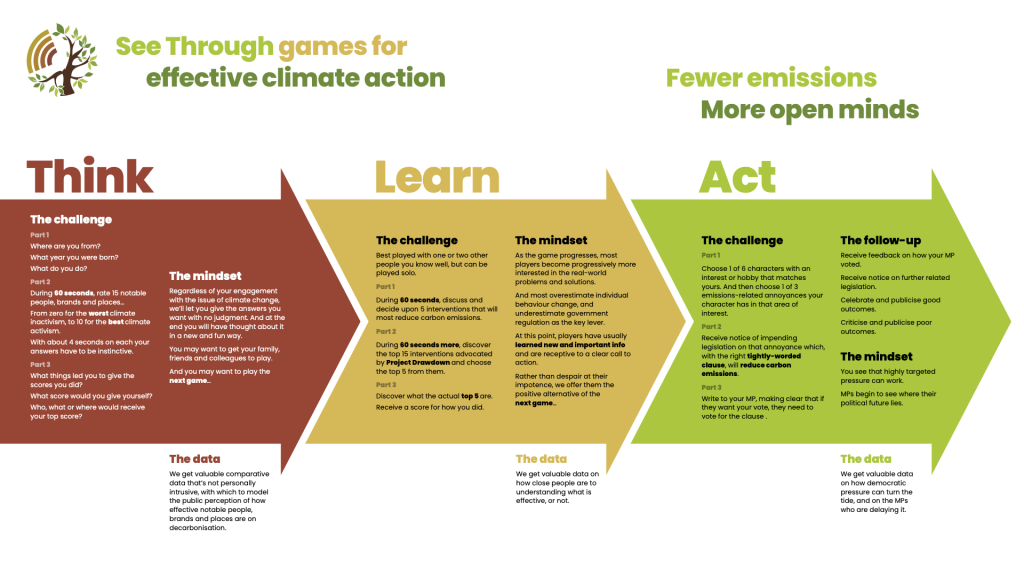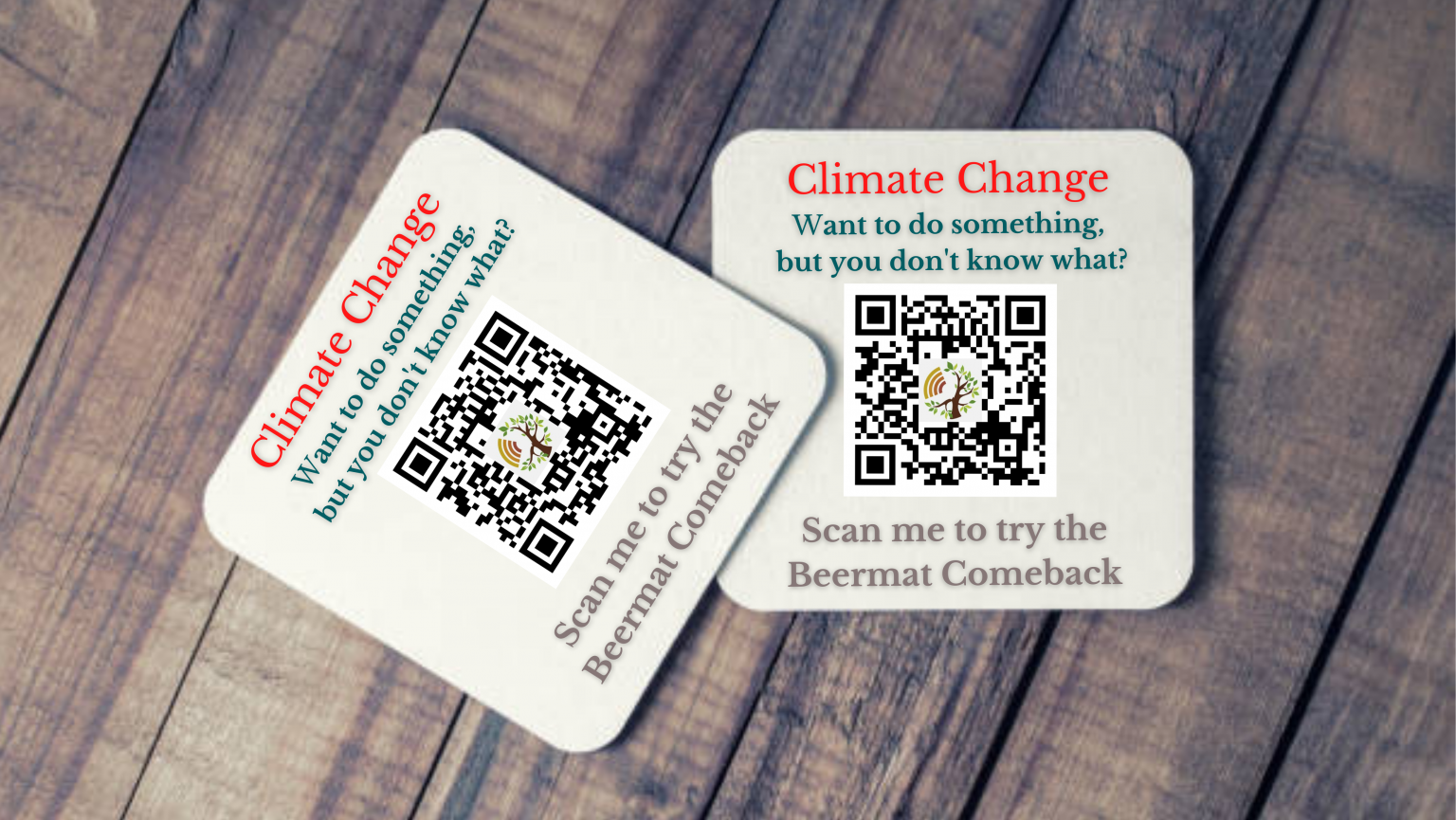The aims, challenges & coding of the critical 3rd part of the See Through Games trilogy – the step that measurably reduces carbon
The Act Game Overview
The Act Game user experience is described in detail elsewhere. Very briefly, it’s the third, final and crucial part of our See Through Games trilogy
- The Think Game gamifies players’ opinions on climate activism, and is designed to make Players want to learn the Right & Wrong answers.
- The Learn Game gamifies those Right & Wrong answers, and is designed to make Players want to act on this new information.
- The Act Game gamifies selecting a course of action, and is designed to make Players email their lawmakers, informing them they’ll support them if they support specific carbon reducing legislation, but. not if they don’t.
Here’s the concept in graphic form.

This article discusses:
- the purpose of The Act Game
- the specific challenges of making it work for effective climate action & measurable carbon reduction
- how we’re going to code it
1) Aims
The Act Game is the simplest of the three games to code, but the hardest to maintain.
As the culmination of the See Through Games flow, and the part which measurably reduces carbon, The Act Game is critical to the See Through News Goal of:
Speeding Up Carbon Drawdown by Helping the Inactive Become Active
Once all 3 games are operational and connected, The Act Game will provide metrics to evaluate/demonstrate the Goal’s two elements.
Inactive-Active Conversion
This element of the STN Goal can be measured by tracking our ‘conversion rate’ of people graduating from one game to the next. Specifically, the proportions of:
- Think Game players successfully funnelled into playing The Learn Game
- Learn Game players who end up playing The Act Game
- Act Game players who end up emailing their political representatives or leaders
This metric constitutes a sub-aim in itself, as it quantifies our success in changing individuals from a state of apathy/Ineffective Activism to a state of Effective Activism.
But more critical to our mission is the second element of our Goal, the bit that actually reduces carbon.
Speeding Up Carbon Drawdown Numbers
The Act Game is the effective climate action towards which See Through Games is driving its Players.
If our games project is to succeed in delivering See Through News’s key aim/claim of measurably reducing carbon, The Act Game will need to generate numbers that will demonstrate, prove and measure this process and outcome.
‘Did we make a difference?’ numbers
The Act Game includes a credible metric for evaluating the impact of Act Game emails on the passage of specific legislation. The precise nature of this metric is currently being discussed, and once agreed, will be integrated into the game. It can, of course, be subsequently tweaked or replaced by improved versions.
These are the ‘Did we make a difference?’ numbers that demonstrate our claims that See Through Games can:
- help the Inactive become Active
- result in effective climate action in the form of measurably reducing carbon
The methodology for proving this will probably be imperfect, but it’s important that The Act Game includes a mechanism to generate data that proves or disproves these claims.
It is important that this metric demonstrates the actual marginal effect See Through Games has in nudging carbon-reducing government regulation into existence.
It will require different metrics in different political systems, particularly democracies v. autocracies.
‘Did the Three-Headed Beasts wriggle free?’ numbers
Laws on their own don’t reduce carbon.
There’s little point in going to all the trouble to get a clause inserted into a law that is then flouted, or not enforced.
Measuring this requires 2 numbers:
- A ‘before’ number, i.e., the predicted carbon reduction effect of the clause being proposed, which will be included in any clause The Act Game proposes.
- An ‘after’ number, i.e. the real-world carbon reduction effect, measured as soon as is reasonable following its passage into law. This reporting/evaluation requirement will be included in every clause the Act Game proposes.
These numbers provide an opportunity to keep Players Active over the long-term, rather than be one-off Players. Longer-term contact will not only maintain their motivation by demonstrating the results of playing The Act Game, but provides a database of proven effective activists who could be mobilised for other carbon-reducing projects.
This could work, whatever the real-world outcome might turn out to be:
- If the real-world number is lower than predicted, The Act Game will alert Players, and give them a clear call to action to redress this, either amending the wording to remove a loophole, or urging stricter enforcement.
- If the real-world number is as predicted, The Act Game will also congratulate Players on the effectiveness of their email. This evidence of their Effective Climate Action would motivate Players to keep playing The Act Game, to repeat the outcome.
- If the real-world number is greater than predicted, it’s hard to imagine a more compelling vindication of this form of Effective Climate Action, which will also be communicated to the Players, whether or not they ended up sending emails.
2) Challenges
Each of our planet’s 196 countries has its own form of representation, legislative agenda, and procedure.
This presents a complex, but not insuperable, challenge to customise The Act Game for each jurisdiction.
Localisation is The Act Game’s yin of complexity to its coding yang of simplicity. The three major localisation challenges are:
- Space (i.e. by country)
- Time (i.e. by legislative calendar)
- Words (i.e. by legal clause)
Space: Localisation by country
The Act Game will be bespoke to each country’s political and legislative system.
- Broadly speaking, for ‘democracies’ with a functioning system of electoral representation, the call to Action – the email – will be directed at individual representatives. They’re motivated by re-election.
- In autocracies, the call to Action will be directed at whoever holds the real levers of power in that particular hierarchy of governance. They’re motivated by not getting overthrown by popular discontent.
Each country requires a wording specific to its system, but this is essentially a one-off problem for each new jurisdiction.
As many countries share electoral systems, this wheel will not have to be completely reinvented 196 times. Moreover, lessons from one country can inform and enhance our approach for new countries.
Time: Localisation by calendar
The Act Game requires the constant updating of the content depending on the particular legislative calendar of the country concerned.
Whether democracies or autocracies, all countries are governed by laws, and all laws are made by people. The Act Game simply identifies those people, and informs them in the most specific and direct way possible of the Player’s intentions to vote/support on a very specific, narrow legal clause.
Words: Localisation by Legal Clauses
The Act Game is designed to convince Players to respond to the game’s call to action, i.e. send an email to their political representative/leaders quoting a specific legal clause that would measurably reduce carbon, and informing the addressee that their action/inaction will determine their voting intention/degree of support for that individual.
The wording of these clauses is critical to our claim to measurably reduce carbon. They must be as tightly worded as possible to avoid any misinterpretation, wilful or otherwise, and close off any potential loopholes.
There are simple and complex solutions to this challenge.
Simple Solution: off-the-shelf clauses
In every country, there are existing organisations who in some form or other are drafting zero-carbon legislation on a day-to-day basis.
In some countries, these are Green Parties, in others, think tanks, charities, or academic bodies.
In potential pilot countries like the UK and Germany, the Green Party would be a fine practical quick-and-dirty solution. They’re literally already paying people to do just this, with completely overlapping carbon-reduction objectives.
For practical purposes, our pilot Act Games could simply adopt the clauses local Green Parties are proposing.
Complex Solution: STN bespoke clauses
Longer-term, STN could accrue sufficient volunteer expertise to construct or tweak our own clauses.
See Through News’s social media network could provide this, as it grows and assembles teams of qualified volunteers united by the same simple carbon-reduction goal.
Coming up with Act Game clauses could become a specific goal of certain Geographic-based Groups:
- See Through Brazil
- See Through Japan
- See Through Burkina Faso
- See Through Cambodia etc.
and/or certain Topic Groups:
- See Through Energy
- See Through Building
- See Through Food
- See Through Education etc..
The advantage of developing our own clauses is that, as a zero-budget volunteer non-profit, See Through News is not obliged to make the compromises made by those who for one reason or another (usually funding) need to take into account the input of various Three-Headed Beast ‘stakeholders’.
In time, the STN ‘gold standard’ clause, which focuses exclusively on carbon reduction irrespective of any ‘practical’ realpolitik considerations, may be a useful lever to frame negotiations, even if not adopted in its entirety.
The STN clause, even if dismissed as purist’, ‘naive’, or ‘impractical’, will provide a benchmark against which the degree of compromise of other alternatives can be measured, in bald CO2 equivalent numbers. This could be a powerful tool for effective climate action.
Imagine reading coverage of a Parliamentary debate about a given topic, which included the following table.
| Clause Proposed by: | Reduction in CO2 equivalent (in Gt) |
| STN | 10 |
| Government | 2 |
| Green Party | 8 |
| Party X | 4 |
| Party Y | 7 |
3) Coding
Nitty Gritty
Details of Content Management Systems, the relative merits of SQL v. Graph database platforms, and coding languages are not the subject of this article. Such technical matters are best left to experts.
But if you’re interested – ever better, if you have coding expertise you’d be interested in volunteering to help us make these games – we’ll shortly be making See Through Games available for such expert scrutiny.
The See Through Games Brains Trust
The development of The Think Game, The Learn Game and The Act Game is being overseen by See Through News’s Brains Trust.
This is an informal international network of experts in a variety of related disciplines, including AI, game design, coding, visual effects, graphic design, sound design and marketing.
MVPs & Repos
Coding volunteers working on The Think Game are currently developing an MVP, or ‘Minimum Viable Product’. This is developer jargon for ‘prototype’.
The Think Game is the most technically complex of the three See Through Games, so we hope to soon be able to produce MVPs for The Learn Game and The Act Game.
When ready, these MVPs will all be made public on a Repo – ‘repository’, more developer jargon for a shared software engineering workspace site. We’re using the open source software development platform GitHub.
Repos are open-source sharing communities, where anyone is welcome to volunteer their services to help code particular projects.
Help Make See Through Games
If you have, or know anyone who has, such skills, and may be convinced by our open-source, zero-budget experiment in using games to Speed Up Carbon Drawdown by Helping the Inactive Become Active, please get in touch.
We’ll update this article when the Repo is live, but if you’d like to ask more, or request to be alerted when this happens, please email:
Email: games@seethroughnews.org

